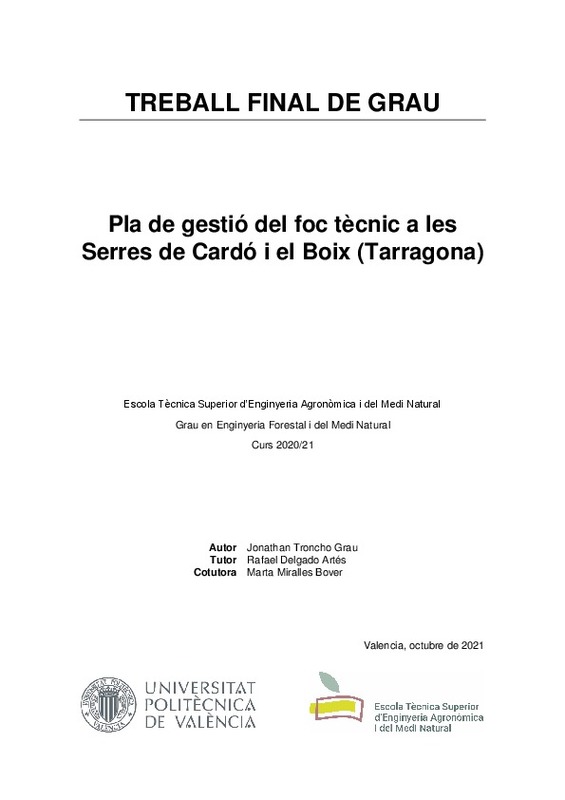|
Resumen:
|
[ES] El fuego ha estado presente en el mediterráneo como un fenómeno natural y modelador del paisaje mucho antes que el ser humano existiese. Además, la actividad del fuego en la gestión del territorio ha sido (y es) una ...[+]
[ES] El fuego ha estado presente en el mediterráneo como un fenómeno natural y modelador del paisaje mucho antes que el ser humano existiese. Además, la actividad del fuego en la gestión del territorio ha sido (y es) una herramienta esencial que desde la revolución neolítica ha permitido crear, mantener y modificar multitud de paisajes rurales en todo el planeta. Los ecosistemas de la cuenca mediterránea son dependientes de los incendios forestales y han evolucionado juntamente con la recurrencia de este fenómeno ecológico natural. Por tanto, desde un punto de vista ecológico, es imposible hablar de los ecosistemas mediterráneos sin contemplar el papel fundamental del fuego a fin de entender la dinámica de estos espacios. No obstante, tras el abandono agrario de la segunda mitad del siglo XX y el consecuente crecimiento de la vegetación forestal, los incendios forestales son hoy en día la perturbación dominante en la mayor parte de nuestros paisajes y en los últimos años se ha convertido en un grave riesgo para la seguridad de las personas, bienes y medio natural. La presente configuración del paisaje y la estructura de los bosques, con una gran acumulación de combustible, dan lugar a fuegos de intensidad y velocidad elevadas que sobrepasan la capacidad de actuación de los sistemas de extinción. Este problema se agrava en el contexto de calentamiento climático y, unido a los drásticos cambios socioeconómicos vividos en las últimas décadas, apunta a que la ocurrencia y magnitud de los incendios tiende a aumentar. Por tanto, se hace evidente que la gestión forestal actual y futura debe ser capaz de integrar el fuego como a un condicionante intrínseco, lo que supone la necesidad de un cambio de paradigma no únicamente focalizado en la extinción sino en la gestión del régimen de incendios en su conjunto. El presente Plan de Gestión del Fuego Técnico en las Sierras de Cardó y del Boix se redacta para responder a la clara necesidad de gestionar de una forma razonable el problema de los grandes incendios forestales que amenazan el macizo, y propone una solución realista a medida de este espacio mediante el uso del fuego técnico, planificando actuaciones encauzadas a la gestión del combustible en puntos estratégicos del macizo para la prevención de los grandes incendios.
[-]
[EN] Fire has been present in the Mediterranean as a natural phenomenon and shaper of the landscape since long before human beings existed. Additionally, the role fire plays in the management of the territory has been, and ...[+]
[EN] Fire has been present in the Mediterranean as a natural phenomenon and shaper of the landscape since long before human beings existed. Additionally, the role fire plays in the management of the territory has been, and still is, an essential tool that, since the Neolithic revolution, has made possible the creation, maintenance, and modification of a wide range of rural landscapes throughout the planet.
The Mediterranean basin¿s ecosystems are dependent on wildfires and have evolved alongside the recurrence of this natural ecologic phenomenon. Therefore, from an ecological stance, it seems impossible to talk about Mediterranean ecosystems without considering the essential role fire plays within the dynamics of these spaces.
Nevertheless, due to the abandonment of agriculture and farms during the second half of the 20th Century, and in consequence, the growth of forest vegetation, wildfires are currently the predominant disturbance in most of our landscape. Over the past years, wildfires have become a serious risk for the safety of people, property, and natural environments. The current configuration of the landscape and forest structures presents with a large accumulation of fuel. This gives place to intense and fast-evolving wildfires that overtake the capacity of the extinguishing systems to act upon them. Within the climate change context, the phenomenon seems to be aggravated and, alongside the drastic socio-economic changes experienced during the most recent decades, it seems that the occurrence and magnitude of wildfires tends to increase.
Therefore, it seems evident that current and future management should be capable of integrate fire as an intrinsic conditioning factor, which implies the need for a paradigm shift towards an approach that does not only focus on extinction but also on the management of the fire regime.
This Technical Fire Management Plan for the Cardó and el Boix mountains has been drafted with the aim of responding to the present need to manage the problem regarding wildfires threatening the massif, and proposes a realistic solution tailored to this space, through the implementation of technical fire and, planning actions aimed at managing fuel in strategic points around the massif for the prevention of large fires.
[-]
|







